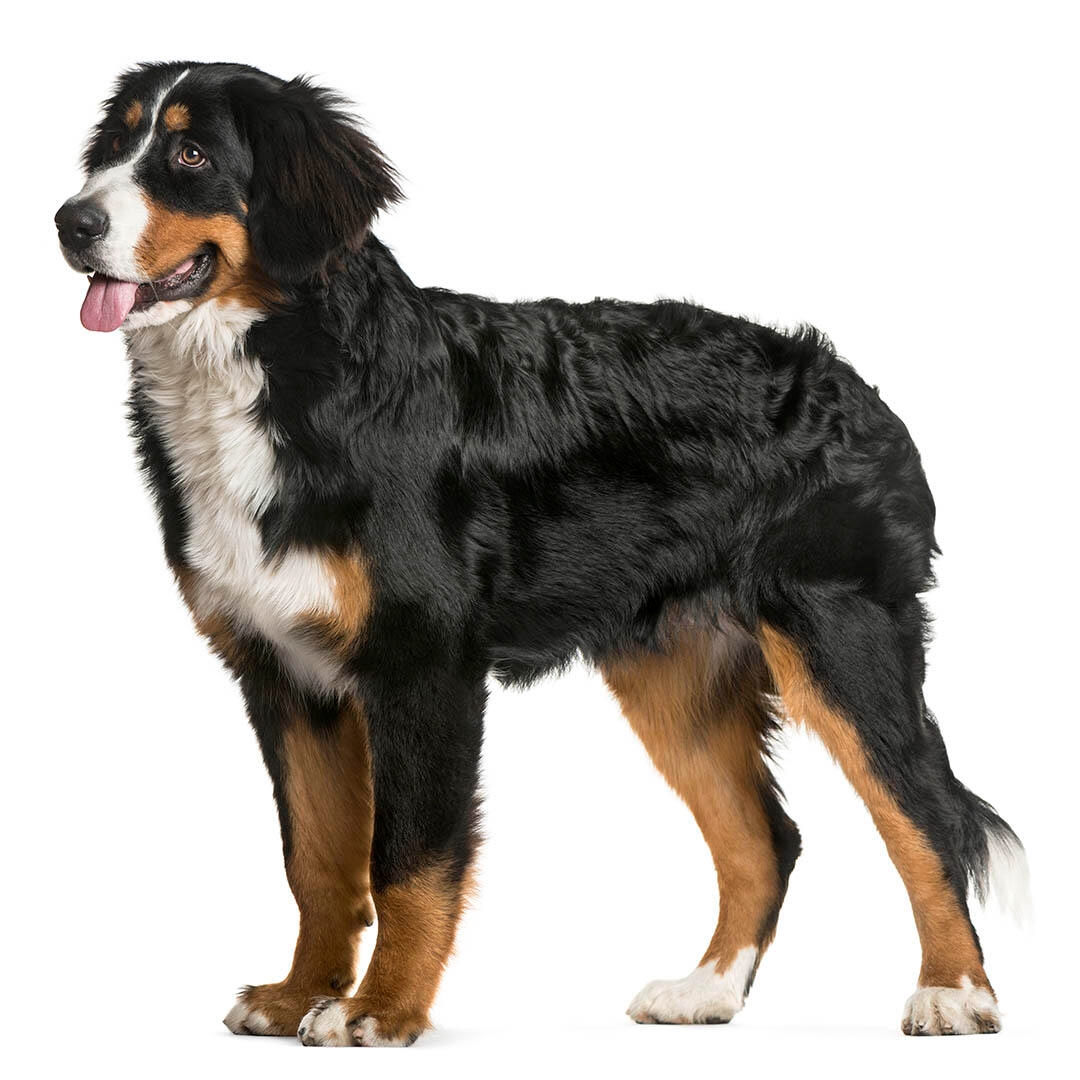
| Family-friendly: | 5/5 |
| Exercise needs: | 3/5 |
| Easy to train: | 4/5 |
| Tolerates being alone: | 1/5 |
| Likes other pets: | 3/5 |
| Energy level: | 4/5 |
| Grooming needs: | 4/5 |
| Shedding: | 5/5 |
The Bernese Mountain dog breed can suffer from:
- Hip dysplasia
- Elbow dysplasia
- Degenerative myelopathy which is a condition which causes progressive paralysis in a dog's hindlimbs.
- Hot spots which are patches of skin which become sore and infected.
- Cruciate disease where the ligament in the knee becomes damaged resulting in limping and pain.
- Histiocytic sarcomas which are a type of cancer.
Priority Kennel Club health schemes and testing:
- Hip dysplasia screening scheme
- Elbow dysplasia screening scheme
Boasting a strong and sturdy build, friendly disposition and a soft and silky coat with a thick underlay, this dog breed is cherished for being large and lovable. Given the Bernese Mountain Dog size, their proud gait, and their charming temperament, they have an almost noble-looking appearance so they’re sure to get noticed wherever they are.
Bernese Mountain dogs are good-natured pets, who love to be included in all aspects of family life, and make wonderful companions. They are affectionate, patient, and especially good with children, protecting them if necessary. They are social and need to be with people and given plenty of affection. Bernese Mountain Dogs will generally bark to advise the arrival of visitors but will soon settle down again. Provided they have been introduced to cats, and other household animals when young, they will live with them happily.
| Family-friendly: | 5/5 |
| Exercise needs: | 3/5 |
| Easy to train: | 4/5 |
| Tolerates being alone: | 1/5 |
| Likes other pets: | 3/5 |
| Energy level: | 4/5 |
| Grooming needs: | 4/5 |
| Shedding: | 5/5 |
The Bernese Mountain dog (or 'Berner') breed can be traced back 2,000 years to when the Romans invaded Switzerland (then known as Helvetia) with their cattle drovers and guard dogs. These Roman mastiff-type dogs were likely crossed with flock-guarding dogs, who could withstand the severe weather in the Alps, and also served to soften their temperaments. Bernese Mountain Dogs were often used as cart-pullers to transport woven goods or dairy products from village to village.
This is a dog who needs a specialist home by merit of their size! Everything has to be scaled up for this dog – house, garden, car, equipment, food and vet bills… and so needs an owner who can both appreciate this and afford it! This gentle giant is happy with fairly sedate daily exercise but enjoys being part of everything that is going on, being able to wander around their estate, and being with their people. As such, they like to live in a household where there is someone around all the time and where they won’t be left home alone. They often have a tragically short life span and so any owner would need to be prepared for the heartbreak that will bring.
As puppies, exercise should be restricted to allow the bones and joints to form properly. After they are a year old, they can be allowed off the lead for free-running exercise. As adults, the Bernese Mountain Dog needs about an hour's daily exercise.
A large country estate will do nicely! These are giant dogs who take up a lot of room and whose tails are on coffee-table height. While they don’t need a lot of exercise, they do enjoy being able to wander around outdoors so a good-sized garden will be appreciated.
Giant-breed dogs, as well as having giant appetites, benefit from a different balance of minerals and vitamins, supporting different joint and cartilage needs. The Bernese is also prone to bloating and stomach problems. So, try feeding smaller, more frequent meals to help minimise the risk. Proper nutrition along with care can contribute to a Bernese Mountain Dog lifespan reaching 10 years.
Daily grooming is recommended to keep the Bernese Mountain dog breed tangle-free and to reduce the amount of shedding. The hair between the pads should be trimmed regularly.
The Bernese Mountain Dog is a fairly easy-going dog who, while a giant, doesn’t need too much training to ensure they are easy to live with. Any large breed however, needs some basic training in order to be a safe and reliable member of canine society, so they should be taught all the basics including walking on a lead and a reliable recall.
The Bernese Mountain Dog breed makes an ideal family dog as they love everyone. They may just be too big for smaller children and as they aren’t very portable, they’re not good for families who are always out and about as they don’t like being left alone.
While many dogs are traditionally thought of as being good with children, all dogs and children need to be taught to get on with and respect each other, and be safe together. Even so, dogs and young children should never be left alone together and adults should supervise all interactions between them.
Due to their affectionate and calm spirits, the Bernese Mountain Dog breed makes an excellent pet and can also get along really nicely with children.
Unfortunately, the biggest con of owning a Berner is their short lifespan as they don’t generally live more than 10 years. They also need plenty of space given the large Bernese Mountain dog size, and can be prone to anxiety attacks.
As their instinct is to protect and be a watchdog, Berners can be quite vocal and have a tendency to bark loudly.
Yes, Berners can be quite lazy and will like sitting next to their owners when at home but it’s important to try and exercise them a few minutes a day.